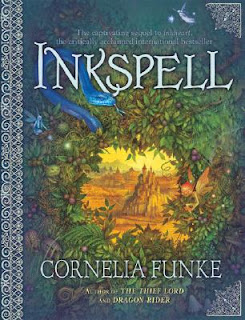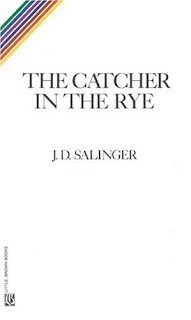
I can't say that I am entirely
enthralled with Ms.
Funke's characters here.
Inkspell did take place in another world, which is more my kind of thing than
Inkheart, but there was still something missing from its pages. I think it might have too many characters. I know that's a weird criticism, but hear me out.
I've read several books where the narrator changes throughout the work. It was the case with parts of
Twilight, and it happens in some really great works like
The Member of the Wedding. I like getting a fresh perspective on things from a new character's point of view, but in the
Inkheart Trilogy, the story is told in the third person, and the focus shifts from one character to another or one group of characters to another without any rhyme or reason except that we need to know what's going on with other people. It's a sort of spatial organization that I'm not all that into. I also think it's a kind of sloppy narrative technique because there are other ways of finding out what other characters have been up to. Story time, flashbacks, etc. So, I still felt a little lost by the end of this book. I felt like I still didn't know any of the characters as well as I would like to, and thereby hadn't really gotten close enough to anyone to want to run out and buy the third book.
Plot wise, we're dealing with similar issues. Yes, Capricorn is dead, but Meggie decides she wants to read herself into what she has christened the "
Inkworld" that her mother has told her so much about. As
Dustfinger has already been read back home,
Farid brings Meggie the piece of paper that took
Dustfinger home, and she reads both herself and
Farid into the book. We haven't heard the last from
Basta or
Mortola (obviously) and these two almost interesting
villans show back up to seek revenge on Mo and
Resa. They are all read back into the book. So, the major portion of the action takes place in "
Inkworld," but it's basically the same deal.
Basta and
Mortola are after Meggie, Mo, and Theresa (
Resa).
Dustfinger is trying not to die because he knows the original story dictated his death, and
Farid is trying to stay as close to
Dustfinger as possible. In the "
Inkworld" things have gone awry since Capricorn was read out of the book. The Laughing Prince becomes The Prince of Sighs after his son's death, and the
Adderhead is preparing to take over the land. The geography of "
Inkworld" doesn't seem too vast, so this is a lot of royalty and a lot of government for such a small place. In any case,
Fenoglio (read into the story in
Inkheart) is trying to fix things by writing and getting Meggie to read aloud. It all gets jumbled and messy, obviously.
What is great about this book?
Dustfinger. In the first book, he was simply a quasi-
villain. He had sympathy for the heroes, and he had a good motivation for working with the bad guys, but he was a traitor and rather annoying with his constant drive toward his own world. In this book, he is attractive, daring, loving, inventive, brave...you know, all those great hero traits. He's still slightly Byronic--he hasn't been a good father or husband, he loves fire more than people, but he really does show an amazing capacity for self sacrifice. And the self sacrifice culminates in the final scenes.
Farid is stabbed in the back by
Basta (this did not upset me, but I would be admitting some rather personal prejudices here to explain), and
Dustfinger is crushed. Even though he loves his wife, Roxanne (the most beautiful woman in the land), he gives himself to the "white women" (harbingers of death) in order to restore
Farid's life.
Farid's a
whiny baby. Ugh.
So, as if the whole slightly flat characters, spatial organization, and abundance of government didn't put me off enough, she's now killed off one of the most interesting of the flat characters. Needless to say, I didn't run out to by
Inkdeath. I'm reading
The Catcher in the Rye now, and I'll pick up
Inkdeath when I have more money.
 What to say about Inkdeath? It's been a month since I read it, and though I should have written on it immediately, I, of course, did not. I still think my earlier criticisms of the books stand. She has too many characters. I feel like she could have spent a lifetime developing the characters in this book into a longer series or even multiple series. She has some wonderful ideas, but they are way too condensed.
What to say about Inkdeath? It's been a month since I read it, and though I should have written on it immediately, I, of course, did not. I still think my earlier criticisms of the books stand. She has too many characters. I feel like she could have spent a lifetime developing the characters in this book into a longer series or even multiple series. She has some wonderful ideas, but they are way too condensed.




